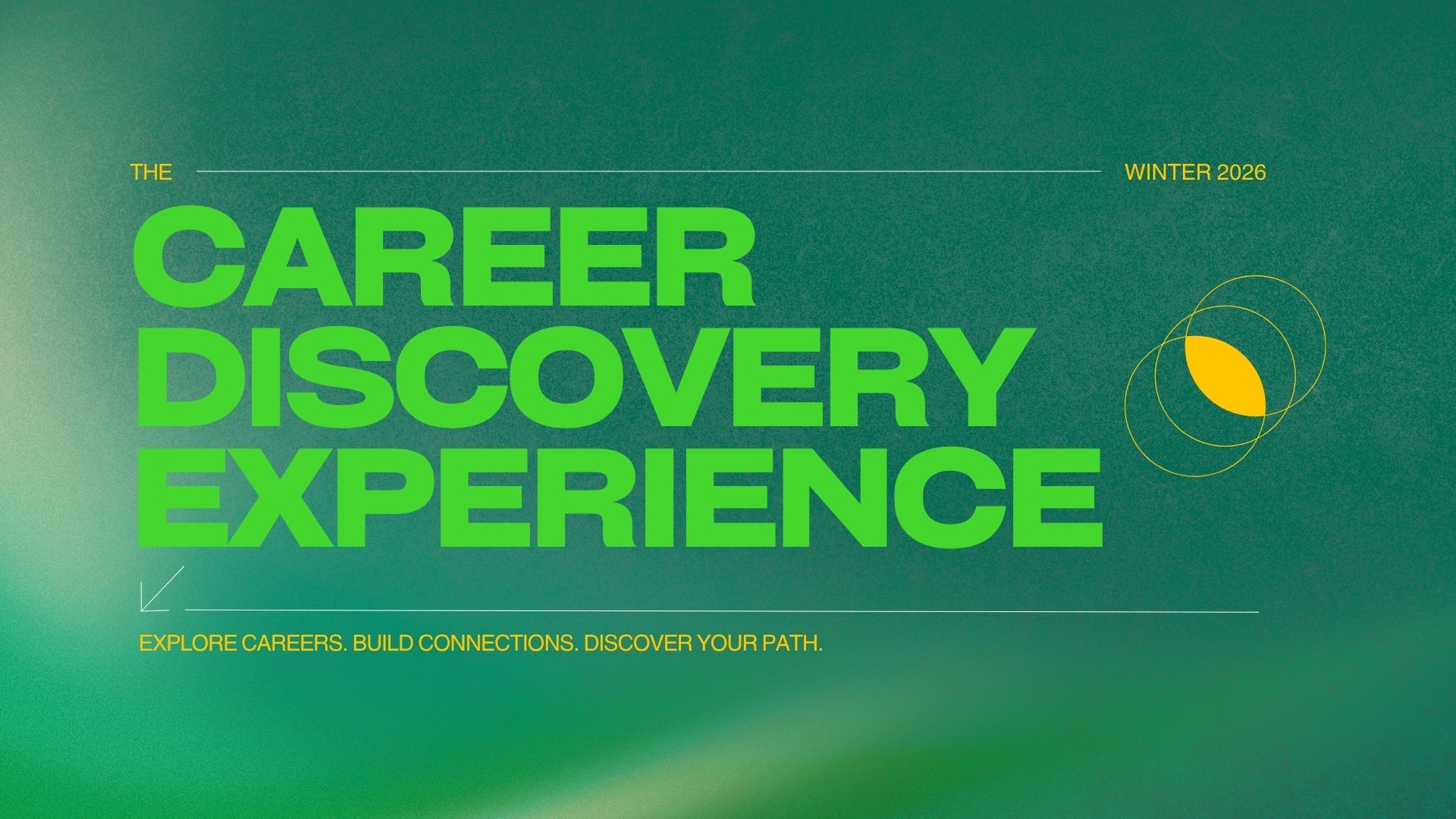The career discovery experience | host information

WHAT IS THE CAREER DISCOVERY EXPERIENCE?
The Career Discovery Experience connects first-year and sophomore students with alumni
and professionals for virtual career exploration during winter break (January 5-16,
2026).
This isn't an internship or traditional job shadowing—you won't be completing work tasks or being evaluated on performance. Instead, you'll engage in meaningful career discovery through extended conversations and observational experiences designed to help you explore possibilities, ask questions, and build connections with professionals who want to help you discover what's possible.
HOST REGISTRATION NOW CLOSED (2025-2026)
Why host a student
Help shape a student's future. Your insights and authentic career stories can help a student discover a path they're passionate about—or realize a field isn't the right fit before they invest years pursuing it. Either outcome is valuable.
Your journey matters. Whether your path was linear or full of unexpected turns, students benefit from hearing real stories about how careers actually unfold. The challenges you've faced, the lessons you've learned, and the decisions you've made—all of this helps students navigate their own paths.
Give back in a meaningful way. This is a flexible, high-impact way to support students without the time commitment of traditional mentoring or campus visits. A half-day of your time can make a lasting difference.
Students ask great questions. Hosting often reminds professionals why they love their work, prompts reflection on their own career journeys, and brings fresh curiosity to their field. Many hosts find the experience energizing and rewarding.
You design the format. Choose what works for your schedule—a focused half-day conversation, virtual observation sessions, multiple touchpoints throughout a week, or even a full day if you're excited to dive deep. All virtual, all flexible, all on your terms.
Connections work both ways. Many hosts stay in touch with their students, later hiring them as interns, recommending them for opportunities, or simply enjoying watching their careers unfold. You're building relationships, not just giving one-time advice.
sample Discovery formats
Not sure what to do with your student? Here are proven formats that work well. Remember: You design what fits your schedule and style. These are just ideas to spark your thinking.
Time: 3-4 hours (can split into two 2-hour sessions)
Best for: Professionals who love storytelling and answering questions
What it looks like:
Part 1 (60-90 min): Share your career journey
- How you got into this field (was it planned or accidental?)
- Key turning points and decisions
- What you wish you'd known when you were in college
- Typical day-to-day realities of your work
Part 2 (60-90 min): Deep-dive Q&A
- Student asks prepared questions about your field
- Discuss specific topics they're curious about
- Share honest insights about challenges and rewards
- Discuss skills, education, or preparation needed
Part 3 (30-60 min): Advice and Next Steps
- Based on what you've learned about the student, offer tailored guidance
- Suggest resources, connections, or experiences to explore
- Discuss how to test whether this field is right for them
Time: Half-day to full day
Best for: Professionals with meetings, client calls, or collaborative work that students can
observe
What it looks like:
Opening conversation (30 min): Introduce yourself, explain what student will observe, set context
Observation period (2-3 hours): Student virtually observes:
- Team meetings or client calls (if appropriate and confidential info protected)
- You working through typical tasks while narrating what you're doing
- Decision-making processes or problem-solving in real time
- How you prioritize and manage your day
Debrief conversation (60-90 min):
- Student asks questions about what they observed
- ·You explain context, challenges, and why you made certain decisions
- Discuss what surprised them or differed from expectations
- Share insights about skills needed and career progression
Why this works: Students see the reality of your work—not just hear about it. Observation makes abstract career descriptions concrete and reveals aspects of work that are hard to explain.
Time: 3-5 sessions of 45-90 minutes each across 5-7 days
Best for: Busy professionals who can't block a full half-day, or those who want students to
see work across different days
What it looks like:
- Session 1: Career journey conversation and field overview
- Session 2: Student observes a specific aspect of your work (meeting, project work, etc.)
- Session 3: Deep-dive on a topic student is curious about (work-life balance, specific skills, advancement)
- Session 4: Student observes different type of work or meeting
- Session 5: Wrap-up conversation, advice, and next steps
Why this works: Spreads the commitment across multiple days, making scheduling easier. Students see variety in your work rather than just one slice. Allows time between sessions for student to reflect and generate new questions.
Time: Half-day (or full day if mutually desired)
Best for: Professionals with varied daily activities who can narrate their work
What it looks like:
Morning (9am-12pm):
- Student joins your morning routine virtually
- Walk through your to-do list and explain priorities
- Share screen while working through tasks, explaining your thinking
- Take a "virtual coffee break" to answer questions
Afternoon (1pm-4pm):
- Student observes scheduled meetings or calls
- You debrief after each: "Here's what was happening behind the scenes..."
- End-of-day reflection: What got done, what got pushed, why?
- Wrap-up Q&A about what they observed
Why this works: Students see the full rhythm of your workday—the productive parts and the chaotic parts. They understand how much of work is planning, communicating, problem-solving vs. the "core" work.
Program Timeline
DATE
Event
Audience
October 20
Host applications open
Hosts
November 12
Host applications close
Hosts
November 17
Student applications open & directory published
Students & Hosts
December 2
Student applications close
Students
December 5
Match notifications sent
Students & Hosts
December 10
MANDATORY Student Orientation
Students
December 17
Optional Host Orientation
Hosts
January 5-16, 2026
Experiences take place
Students & Hosts